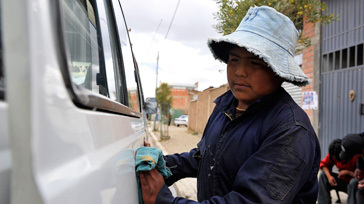Lima, 23 April 2015 (ILO)* – There are at least 27 million youth in Latin America and the Caribbean who work in conditions of informality, said the International Labour Organization (ILO).
“Youth unemployment is very high in the region, but it’s just the tip of the iceberg that hides the wider problem of a lack of opportunities for those who are just starting their productive lives,” said Elizabeth Tinoco, ILO Regional Director for Latin America and the Caribbean at a regional meeting in the Peruvian capital.*
Informality refers to economic activities that operate outside the formal reach of the law or those that, while operating within the formal reach of the law, are not subject to application or enforcement of the law in practice.
The informal economy also results from laws which discourage compliance because they are inappropriate, burdensome or impose excessive costs.
The ILO warned in its report to the meeting that six out of ten jobs available to young people are in the informal economy. In general, these jobs are of poor quality, low productivity and offer low wages.
This means that youth are lacking stability and career prospects, social protection and access to basic labour rights.
“We face a major political challenge, as high unemployment and informality create a scenario which leads to high levels of discouragement and frustration generated by the lack of opportunities,” Tinoco said. She added that when young people can only access poor quality jobs, it jeopardizes their future career path.
A complex scenario
Just over half – 56 million – of the 108 million young people aged 15 to 24 in Latin America and the Caribbean are in the workforce – holding a job or seeking one actively.
Among these youth, 13 per cent are unemployed, three times the rate of adults. It is estimated that over 7 million young people fail to find a job – a number that is equivalent to 40 per cent of total unemployment in the region.
The situation of high youth unemployment is compounded by the rate of youth in informal non-farming activities reaching 55.7 per cent, more than eight percentage points higher than the overall rate of 47 per cent.
Most of these informal jobs for youth are generated in the informal economy, very often in small and micro enterprises that are not part of the formal economy. But informal conditions also affect 32 per cent of young workers in formal enterprises.
In Latin America and the Caribbean there are also more than 20 million young people who are not in education, employment, or training.
Addressing the problem
“We have to address informality and youth unemployment with a combination of policies that respond to the specific needs of each country. Isolated measures generally have little impact and their effect is limited,” said Tinoco.
She stressed that the problem of youth employment is recognized by countries and that they are concerned about its causes and consequences.
“Now we should move from concern to action in order to face the challenges of youth employment, especially at times of a slowing economy that could push up the rates of unemployment and informality,” she said.
The report to the meeting highlighted three areas in which labour informality in the region can be addressed:
- Measures and incentives to create the conditions for the development of formal jobs, including subsidies for business development and programmes to expand youth employment and promote skills;
- Initiatives aimed at formalizing informal jobs and work units, including regularization schemes, labour inspection, and support to the formalization of micro enterprises with low productivity; and
- Strategies to expand the coverage of social protection to informal workers, such as unemployment benefits, health insurance and maternity protection.
*Source: ILO.
2015 Human Wrongs Watch






